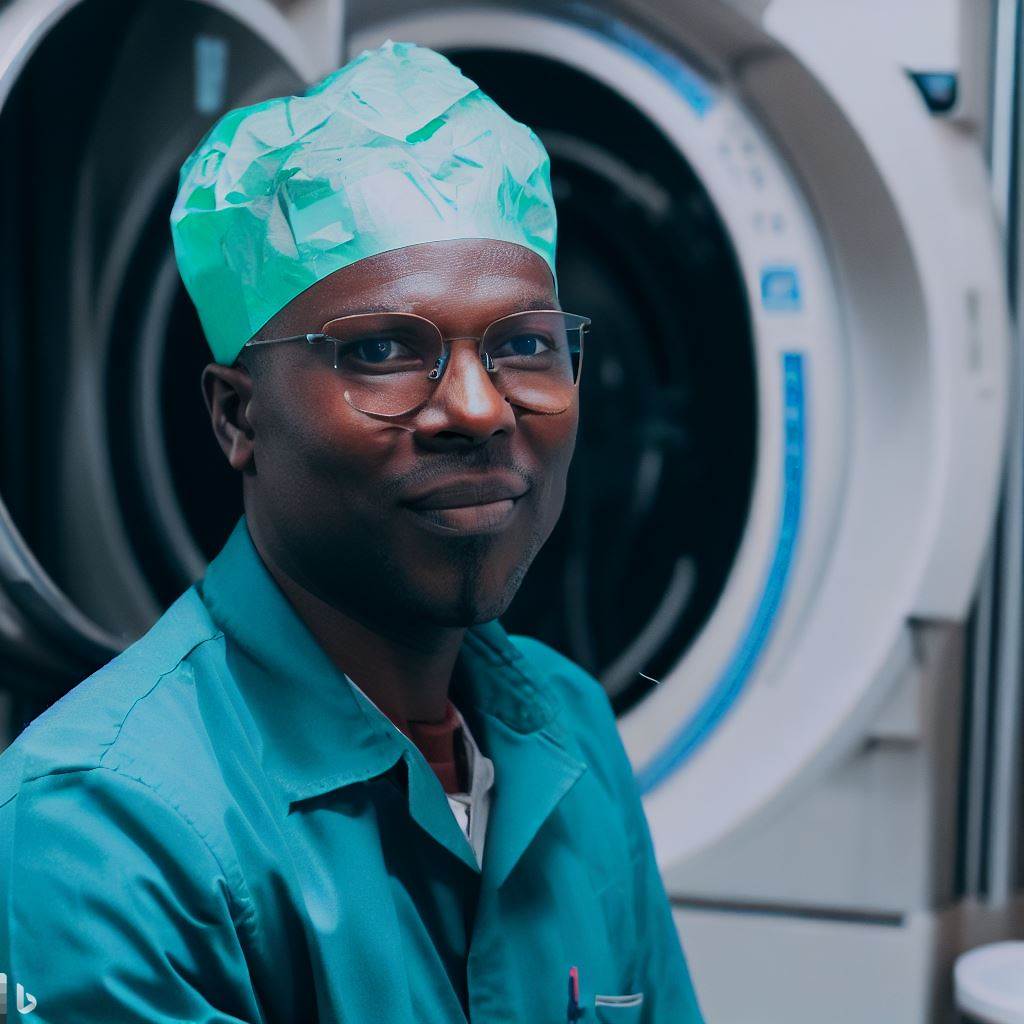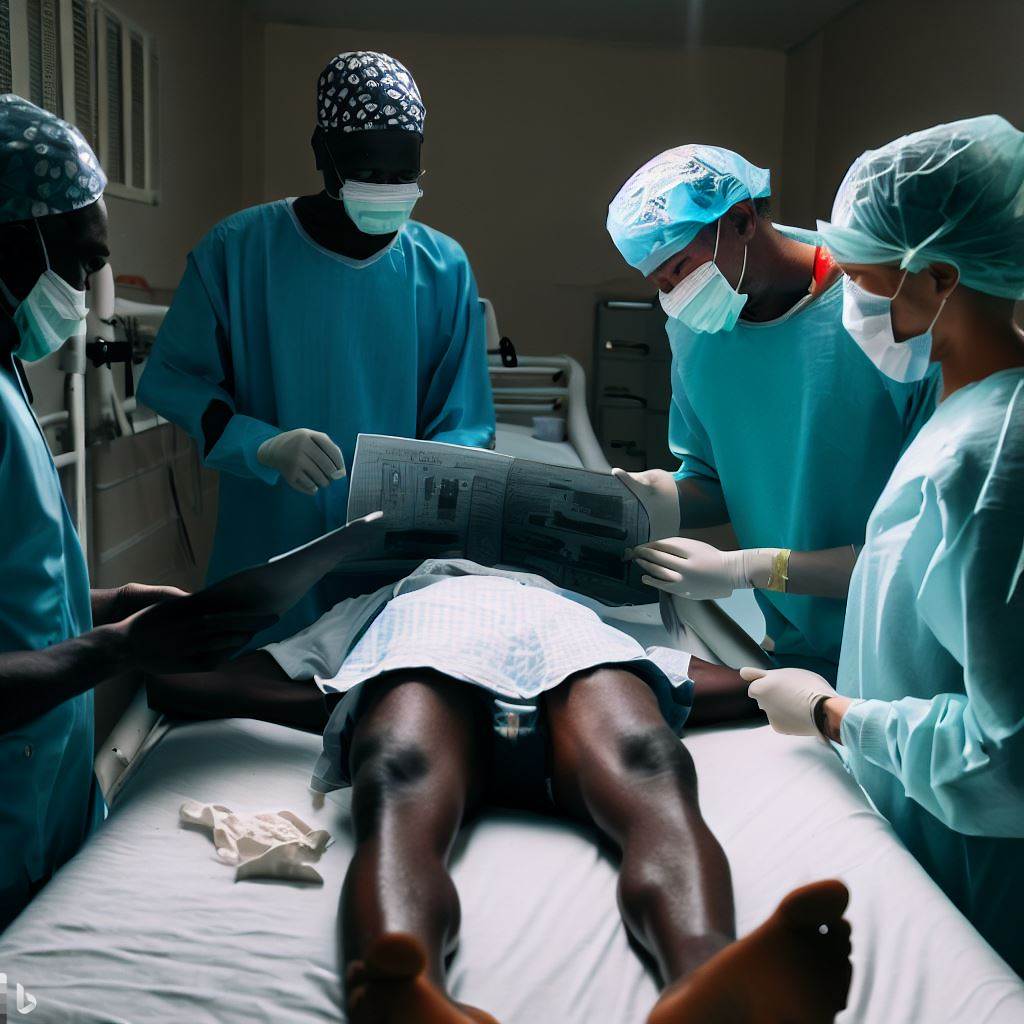Introduction
MRI technologists are skilled professionals responsible for operating magnetic resonance imaging (MRI) machines, creating intricate images of patients’ internal structures.
This blog post is dedicated to exploring the intricacies of MRI technologists’ work environment within Nigeria.
It aims to delve into the various facets that shape their daily routines, including patient interactions, equipment handling, safety protocols, and collaboration with medical teams.
By examining these factors, the post seeks to provide a comprehensive understanding of the challenges, responsibilities, and rewards that MRI technologists encounter in their pursuit of delivering accurate and impactful diagnostic imaging services in the Nigerian healthcare landscape.
Overview of MRI Technology in Nigeria
General Background on the Use of MRI Technology in the Country
MRI technology has gained significant prominence in Nigeria’s healthcare sector.
Introduced in the late 1980s, it has become a crucial tool for medical diagnosis.
The use of MRI machines has gradually expanded in hospitals across the country.
Nigeria currently has a considerable number of MRI facilities, especially in major cities.
MRI technology has improved the accuracy and efficiency of medical diagnoses in Nigeria.
Prior to MRI, doctors relied on less advanced imaging techniques for diagnosis.
The availability of MRI technology has revolutionized the field of radiology in Nigeria.
Public and private hospitals have embraced MRI technology for various medical specialties.
Importance and Growth of MRI Technology in Healthcare
MRI technology plays a crucial role in the detection and diagnosis of medical conditions.
It offers detailed images of internal body structures, aiding accurate interpretation.
Doctors rely on MRI scans to identify abnormalities in organs, tissues, and bones.
Transform Your Career in Nigeria
Discover unmatched expertise with our personalized Career Consulting service. Navigate Nigeria’s job market with a strategy tailored just for you.
Get StartedMRI technology allows for non-invasive examinations, reducing patient discomfort.
With MRI, early detection of diseases becomes possible, leading to better patient outcomes.
The growth of MRI technology has led to increased specialization and expertise in Nigeria.
Healthcare professionals receive training to operate and interpret MRI scans effectively.
As the demand for MRI scans rises, more MRI technologists are being trained in Nigeria.
MRI technology has indeed revolutionized Nigerian healthcare. Since the late 1980s, MRI machines have transformed medical diagnosis.
This contrasts with less advanced imaging techniques, which often offered limited insights.
Recent years have witnessed a rapid proliferation of MRI facilities in Nigeria’s major cities. Public and private hospitals now house numerous MRI machines.
MRI’s scope extends across medical disciplines, including neurology, oncology, and orthopedics.
Essential to healthcare, MRI aids doctors in diagnosing diverse medical conditions. Detailed internal images enable precise interpretation, leading to timely, accurate diagnoses.
This non-invasive technique revolutionizes medical assessments, prioritizing patient comfort.
Early disease detection is pivotal. MRI excels in this realm, identifying organ, tissue, and bone irregularities. Swift detection enhances intervention, augmenting patient outcomes.
MRI is indispensable for diagnostics and monitoring in Nigeria’s healthcare.
MRI’s growth impacts professionals too. Rising demand emphasizes MRI interpretation expertise. Radiologists, radiographers, and technologists undergo specialized training.
Dedicated Nigerian programs produce skilled MRI technologists.
In summation, MRI profoundly shapes Nigeria’s healthcare. Its arrival transforms diagnosis, promoting accuracy and speed. Expanded machine availability benefits diverse specialties. MRI’s rise calls for trained technologists and specialists, amplifying its pivotal role in Nigerian healthcare.
Read: Overview of the Speech-Language Pathology Profession in Nigeria
Role of MRI Technologists in Nigeria
Specific Responsibilities and Duties of MRI Technologists
- Performing magnetic resonance imaging (MRI) procedures on patients using specialized equipment.
- Preparing patients for the MRI scan by explaining the procedure and answering their questions.
- Ensuring patient safety and comfort during the entire MRI examination.
- Positioning patients correctly to obtain accurate images and minimize artifacts.
- Operating the MRI machine to produce high-quality images of the targeted body areas.
- Monitoring patients’ vital signs and responding appropriately in case of emergencies.
- Assessing images for clarity and adequacy, making adjustments if necessary.
- Documenting information about the MRI procedure accurately and maintaining patient records.
- Coordinating with radiologists and other healthcare professionals to discuss imaging findings.
- Providing support and reassurance to anxious or claustrophobic patients during the MRI scan.
- Cleaning and maintaining the MRI equipment to ensure its proper functioning.
- Following safety protocols and radiation protection guidelines to minimize potential hazards.
- Continuously updating knowledge about new MRI techniques and advancements in the field.
Training and Education Requirements for MRI Technologists in Nigeria
In order to become an MRI technologist in Nigeria, individuals must fulfill certain training and education requirements:
- Completed secondary education and obtained a high school diploma or its equivalent.
- Enrolled in a recognized institution offering a Bachelor’s degree program in Radiography or Medical Imaging Technology.
- Successfully completed the undergraduate program, which typically takes 4 years to finish.
- Participated in clinical rotations during undergraduate training to gain practical experience.
- Obtained a license from the Radiographers Registration Board of Nigeria (RRBN).
- Undergone additional specialized training specific to MRI technology.
- Attained certification from a recognized professional organization, such as the American Registry of Radiologic Technologists (ARRT) or the Canadian Association of Medical Radiation Technologists (CAMRT).
- Participated in continuing education programs to stay updated with the latest advancements in the field.
It is important for MRI technologists in Nigeria to possess strong technical and communication skills. They should be able to operate complex equipment and interact effectively with patients from diverse backgrounds.
Additionally, maintaining a calm and composed demeanor during emergency situations is crucial for providing optimal patient care.
By fulfilling their responsibilities and staying abreast of emerging technology and practices, MRI technologists play a vital role in the healthcare system of Nigeria.
They contribute to accurate diagnostic imaging, aid in the detection and monitoring of diseases, and provide valuable support to other healthcare professionals.
Read: The Role of Technology in Respiratory Therapy in Nigeria
Working Conditions of MRI Technologists
Working Hours and Schedule of MRI Technologists
- MRI technologists in Nigeria typically work full-time schedules.
- They may be required to work evenings, weekends, and holidays, depending on the healthcare facility’s operating hours.
- Shift work and on-call duties are also common in this profession.
- The working hours can be long, ranging from 8 to 12 hours per shift.
- Technologists may be required to stay beyond their scheduled shifts if emergencies or delays occur.
Physical Demands of the Job
MRI technologists often need to stand for long periods during procedures.
Publish Your Professional Profile, Business or Brand
Showcase your expertise, gain trust, and boost visibility instantly on Professions.ng.
Publish NowThey may need to move and position patients manually, which can involve lifting and transferring.
The physical demands of the job can be strenuous and may lead to musculoskeletal injuries if proper body mechanics are not followed.
Technologists are advised to take regular breaks and practice ergonomic techniques to minimize physical strain.
Hazards and Safety Precautions in Working with MRI Machines
- Working with MRI machines involves exposure to powerful magnetic fields.
- Technologists must ensure that patients and themselves are free of any metallic objects before entering the scanner room.
- Metal objects can become projectiles and cause serious injuries in the presence of a strong magnetic field.
- Proper screening and thorough patient history review are crucial to minimize the risk of accidents or complications.
- Technologists must also adhere to strict safety protocols, including the use of appropriate personal protective equipment.
- They should be aware of emergency procedures in case of adverse reactions or equipment malfunctions during procedures.
Overall, the working conditions of MRI technologists in Nigeria require flexibility in terms of working hours and schedules. The physical demands of the job often involve standing for long periods and lifting patients, which can lead to physical strain if precautions are not taken.
Additionally, working with MRI machines comes with potential hazards related to magnetic fields, requiring strict safety measures and adherence to protocols. By understanding and addressing these challenges, MRI technologists can ensure safe and efficient medical imaging services for patients in Nigeria.
Salary and Benefits for MRI Technologists
Typical Salary Range for MRI Technologists in Nigeria
MRI technologists in Nigeria can expect a salary range between ₦1,000,000 to ₦2,500,000 per year.
The actual salary within this range depends on factors such as experience, qualifications, and location.
Entry-level technologists may start with a salary around ₦1,000,000, while experienced professionals can earn up to ₦2,500,000.
Benefits and Other Compensation for MRI Technologists
Apart from the salary, MRI technologists in Nigeria enjoy various benefits and additional compensation.
- Health insurance coverage is commonly provided by employers, ensuring medical expenses are covered.
- Paid time off and vacation days are included in the benefits package, enabling technologists to have work-life balance.
- Retirement plans, such as a pension or a contributory scheme, are often offered to secure future financial stability.
- Continuing education opportunities are available to help technologists stay updated with the latest advancements in the field.
- Many employers offer allowances for transportation, housing, and other living expenses to attract and retain skilled technologists.
- Shift differentials may be offered to technologists working during weekends, nights, or holidays.
- Some employers provide bonuses or incentives based on performance, encouraging excellence among technologists.
- Career growth opportunities exist, allowing MRI technologists to advance to supervisory or managerial positions.
- Recognition programs or awards may be given to outstanding technologists, boosting morale and motivation.
In summary, MRI technologists in Nigeria can expect a salary range between ₦1,000,000 to ₦2,500,000 per year, depending on their experience and qualifications.
In addition to the salary, they receive a comprehensive benefits package. This includes health insurance coverage, paid time off, retirement plans, and continuing education opportunities.
Employers may also offer allowances, bonuses, and incentives to enhance employee satisfaction. With career growth opportunities and recognition programs, MRI technologists in Nigeria have a fulfilling professional journey.
Read: Public Perception of the Optometry Profession in Nigeria

Work Environment
The typical work setting of MRI technologists in Nigeria
MRI technologists in Nigeria primarily work in hospitals, diagnostic centers, and medical imaging facilities.
They operate within specialized MRI suites or rooms that are designed to ensure patient safety.
The work environment often involves interacting with different medical professionals, including radiologists and other technologists.
These technologists often work in shifts, including nights, weekends, and holidays, to meet patient demand and provide 24/7 services.
Their work setting requires adherence to strict safety protocols to minimize risks associated with magnetic fields and exposure.
They have access to advanced MRI machines and related equipment used for scanning and imaging procedures.
Additionally, they rely on computers and specialized software to process and analyze the captured images.
The work environment may vary depending on the specific healthcare facility and its resources.
The importance of a clean and well-equipped workplace for optimal performance
- A clean work environment ensures the safety and well-being of both the technologists and the patients.
- Proper sanitization prevents the spread of infections and minimizes the risk of cross-contamination.
- A well-equipped workplace is essential for providing accurate and high-quality MRI scans.
- Maintaining state-of-the-art MRI machines and equipment ensures reliable and precise imaging results.
- Having access to up-to-date technology enhances the efficiency and effectiveness of MRI procedures.
- A clutter-free and organized workplace enables technologists to work efficiently and avoids unnecessary delays.
- Ensuring a comfortable and ergonomic work environment enhances the job satisfaction and performance of technologists.
- Well-maintained facilities contribute to a positive overall experience for both patients and healthcare professionals.
- An optimal work environment promotes a culture of professionalism, efficiency, and continuous improvement.
- Investments in workspace hygiene and modern equipment demonstrate a commitment to patient care and quality outcomes.
Overall, MRI technologists in Nigeria typically work in hospitals and diagnostic centers, operating in specialized MRI suites. They work in collaboration with various medical professionals and adhere to rigorous safety protocols.
The cleanliness and equipment quality of their workplaces play a crucial role in ensuring optimal performance and accurate imaging results.
A clean and well-equipped work environment contributes to patient safety, reduces the risk of infections, and enhances overall job satisfaction. It also enables efficient workflow, improves the patient experience, and demonstrates a commitment to providing high-quality healthcare services.
Read: Optometry Practices: Rural vs Urban Areas in Nigeria
Challenges Faced by MRI Technologists in Nigeria
Common Challenges Faced by MRI Technologists
- Equipment maintenance issues are a common challenge for MRI technologists in Nigeria.
- Shortage of skilled professionals is another major challenge faced by MRI technologists.
- Lack of adequate funding for the maintenance and upgrading of MRI equipment.
- Inadequate training programs to equip technologists with up-to-date skills and knowledge.
- Limited availability of MRI machines in many healthcare facilities.
Impact on the Delivery of Quality Healthcare
The challenges faced by MRI technologists in Nigeria can have a significant impact on the delivery of quality healthcare in the country. These challenges can lead to various consequences:
- Delayed or cancelled appointments due to malfunctioning MRI machines or equipment breakdowns.
- Long waiting times for patients, as the limited number of skilled technologists may result in a backlog of cases.
- Reduced accuracy and reliability of MRI scans due to outdated equipment and inadequate maintenance.
- Increased risk of misdiagnosis or missed diagnoses due to the unavailability of skilled professionals.
- Lower patient satisfaction and trust in the healthcare system due to the perceived incompetence or lack of resources.
- Inability to provide timely and accurate diagnoses, resulting in delays in treatment initiation.
- Reduced efficiency and productivity of healthcare facilities, leading to higher healthcare costs.
It is crucial to address and overcome these challenges in order to improve the working conditions of MRI technologists and enhance the quality of healthcare services in Nigeria. The following measures can be taken:
- Investing in regular maintenance and upgrades of MRI equipment to ensure optimal functionality.
- Increasing the number of training programs and opportunities for MRI technologists to enhance their skills.
- Recruiting and retaining skilled professionals by offering competitive salaries and benefits.
- Allocating sufficient funds from the government and healthcare institutions for the procurement of new MRI machines.
- Facilitating collaboration and knowledge exchange between Nigerian MRI technologists and international experts.
- Improving healthcare infrastructure and accessibility by strategically placing MRI machines in various regions.
By addressing these challenges and implementing effective solutions, the delivery of healthcare services in Nigeria can be significantly improved.
MRI technologists will be able to work in better conditions, providing accurate and timely diagnoses, and ultimately contributing to better patient outcomes.
Steps Taken to Improve Working Conditions
Initiatives and Programs for Improving Working Conditions of MRI Technologists in Nigeria:
- The Nigerian Medical Radiographers Board has implemented a code of ethics for MRI technologists.
- The board has also created guidelines for the establishment and maintenance of safe work environments.
- Training programs have been developed to enhance the skills and knowledge of MRI technologists.
- Collaboration with international organizations has led to the introduction of new technologies and techniques.
- Educational institutions now offer specialized courses and certifications for MRI technologists.
- Research grants have been provided to encourage studies on improving working conditions.
The Importance of Ongoing Professional Development and Continuous Improvement
- Ongoing professional development ensures that MRI technologists stay up-to-date with the latest advancements.
- Continuous improvement allows technologists to provide higher quality care and accurate diagnoses.
- Regular training and learning opportunities enhance technologists’ skills and competence.
- Continuous professional development promotes innovation and the adoption of best practices.
- Improving working conditions through ongoing development attracts and retains skilled technologists.
- Enhanced professional growth leads to better healthcare outcomes for patients.
Numerous endeavors have uplifted MRI technologists’ work conditions in Nigeria. The Nigerian Medical Radiographers Board’s ethical code bolsters safety. Guidelines ensure secure environments, covering radiation, equipment, and infection control.
Training programs encompass MRI operation, patient positioning, and safety. Global collaborations introduce technology and techniques. Specialized courses and certifications bolster competence. Research grants promote studies enhancing care and safety.
Ongoing development equips technologists to excel in diagnostics, patient care, and technical troubleshooting. Continued professional growth fosters innovation, job satisfaction, and patient services.
These collective initiatives have substantially elevated MRI technologists’ work environment, underscoring Nigeria’s commitment to exceptional healthcare delivery.
Learn More: Promoting Healthy Eating: The Nigerian Dietitian’s Task
Conclusion
This blog post highlighted the working conditions of MRI technologists in Nigeria.
It emphasized the crucial role of MRI technologists and the need to ensure favorable working conditions for the benefit of patients and healthcare providers alike.




